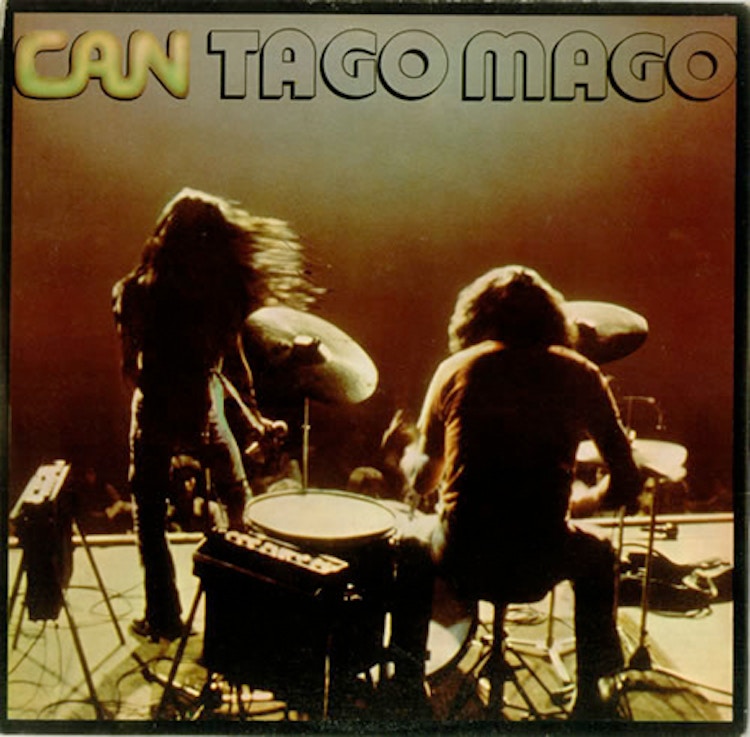Can – Tago Mago (40th Anniversary edition)
"Tago Mago"

Looking for something or someone to blame for encouraging you to shell out some of your hard-earned for, say, Guru Guru’s sludgy blues-rock? Well, as a genre landmark and well-established gateway drug to the wondrously weird world of Krautrock, as the experimental, more or less rock-based sounds cooked in Germany in the late 60′s and 70′s are affectionately known, Tago Mago’s amongst the most likely suspects.
Recorded over a period of months in an ancient castle in the North Rhine-Westphalia region of Germany in 1971, Can’s second album found the band in a state of transition following the departure of original vocalist, American ex-G.I. Michael Mooney and the addition of new singer Damo Suzuki, a Japanese globe-trotter the band had discovered busking in Cologne. Culled from epic jams, transformed from questioning hit-and-miss explorations into seamless hypnotic magic by bassist Holger Czukay’s painstaking editing and collating efforts, Tago Mago finds Can abandoning the few audible influences – Velvet Underground, the outer reaches of garage rock – detectable on 1969 debut Monster Movie. Instead, the album unveils a totally unique, sprawling kosmische mash-up that draws inspiration from every possible reference point between hip-shaking funk action and resolutely high-brow modern classical music without sounding even remotely like anything or anyone else, with results that still startle with their inimitable combination of richly rhythmic earthiness and frequent trips to the outer reaches of the cosmos.
For the most part, Tago Mago excels in deceptive minimalism, with close listens revealing compelling depths in seemingly threadbare tracks. Opener ‘Paperhouse’ starts life as a near-translucent, almost tentatively drifting slow jam, but gradually builds into a honking storm of high-psych rock fury that’s the closest Tago Mago comes to what’s commonly recognised as rock ‘n’ roll. On surface, the awesome – and appropriately entitled – ‘Oh Yeah’ appears stuck in the same gear for its 8-minute duration. In fact, the cut gradually builds a hypnotic momentum to the point where, towards the end, the
band appear to lift off for an extended outbreak of levitation. Then there’s the mammoth-scale, evergreen, ‘Halleluwah’.
According to legend, guitarist Michael Karoli succumbed to hallucinations when drummer extraordinaire Jaki Liebezeit first stumbled upon the track’s oft-sampled, stop/start rhythm, begging his bandmate to keep the beat afloat. No wonder: when Suzuki, after a lengthy breather, grabs the mic again at around the 8-minute mark, it’s easy to imagine that the ecstatic “oh” he emits is in recognition of his colleagues’ indescribable prowess in the area of hypnosis-conjuring intensity. Here’s a band that can make simplicity sound incredibly complex, as well as being capable – when the track at hand so requires – of making virtuoso chops-stretching difficulty sound positively Spartan.
Looking at the extensive track lengths (‘Halleluwah’ sprawls over a mammoth 18+ minutes, the spooky sound collage ‘Aumgn’ is only marginally shorter) and the music’s improvisatory foundations, newcomers would be excused for thinking that Tago Mago consists of the kind of bloated prog fantasies or absurdly stretched boogie workouts that blighted so many of their contemporaries. This couldn’t be further from the truth. Despite the band’s membership consisting exclusively of musicians with highly advanced technical skills, Can members willingly remove their hands from their instruments for lengthy periods when silence on their part is what the collective good calls for. Take the seminal psych-groove workout ‘Mushroom’ as an example. Apart from the sparsest of bass lines and odd sprinklings of Karoli’s guitar, totally devoid of the type of blues-derived noodling you’d associate with standard issue guitar heroics in 1971 or 2011, the track’s built out of little but Liebezeit’s drum beat, a typically infectious monster rhythm that mixes earth-trembling elemental force with precision worthy of a highly advanced drumming robot. It’s no wonder Liebezeit, hard at work behind his stripped-down kit, is situated in the front-centre of this reissue’s cover, which rehashes the live image used for Tago Mago’s original UK release: in a genuinely democratic band of equals, Liebezeit’s prowess in the field of uniquely European funk power allows him to hover a few inches over his colleagues.
Then there’s Suzuki. It’s easy to dismiss his improvised incantations – the key hook of ‘Halleluwah’ finds Suzuki banging on
about “searching for his black dope”, which, according to Karoli, he’d misplaced at the session – as the stoned ramblings of a bona fide freak-out casualty. But his melodic contributions act as a lighthouse that occasionally guides the musicians to a calm harbour amidst their extensive travels on the often stormy seas of improvisational exploration. It’s surely telling that once Suzuki had left the ranks, Can gradually descended into exactly the kind of muso-friendly tedium their early masterworks had so skilfully avoided.
To be honest, Tago Mago’s not entirely perfect. It’s unlikely that even the staunchest of, er, Canatics will visit the absurdly extended sound collages ‘Augmn’ and ‘Peking O’ very often, the latter’s berserk blend of rebellious drum machines and sped-up shrieking in particular soon becoming about as alluring as the sound of nails travelling down a blackboard. The bonus live disc, meanwhile, showcases the sprawling Can sound in its organic, untainted form with results that, although hugely fascinating to aficionados, could easily scare off newcomers. The fact that the extra CD’s three tracks stretch to a barely believable 50 minutes certainly proves how crucial Czukay’s editing skills were to maintaining Can’s impeccable strike rate. That said, ‘Spoon’ packs many thrills into its restlessly shape-shifting 30 minute (!) journey, with Suzuki in full testifying-soul-man mode being especially entertaining, whilst the live take on the mighty ‘Halleluwah’ is, contradictorily, gentler yet fiercer than its studio counterpart.
Get the Best Fit take on the week in music direct to your inbox every Friday

Great Grandpa
Patience, Moonbeam

Deafheaven
Lonely People With Power

Perfume Genius
Glory






